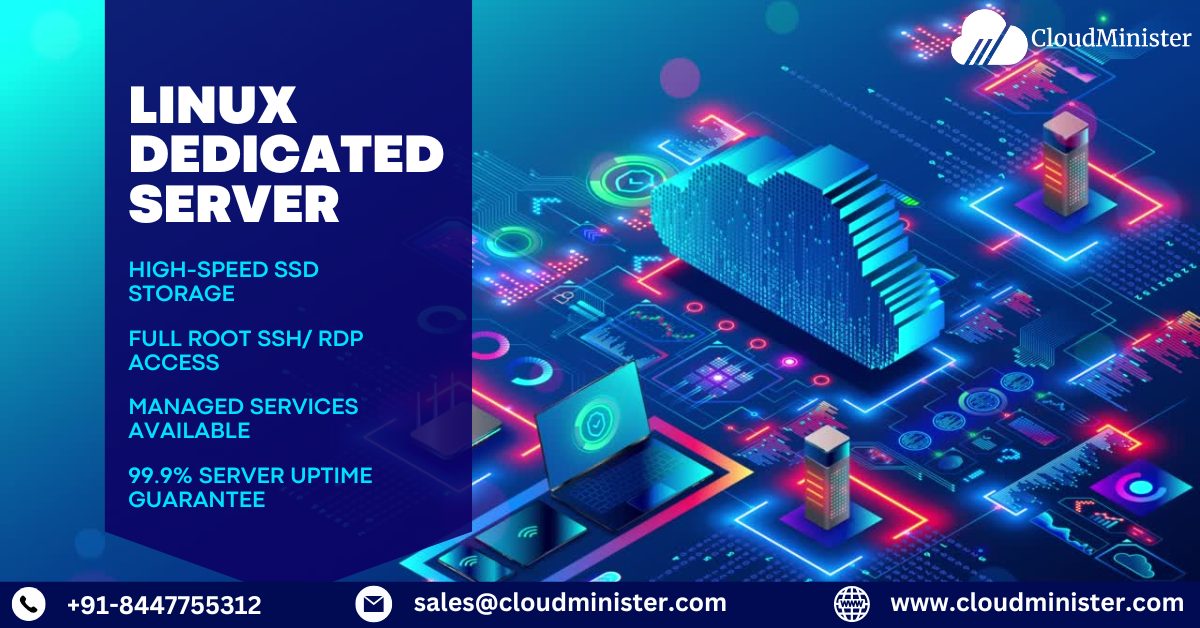Maintaining strong security for your Linux dedicated server is more critical than ever in 2024. As threats evolve, implementing the right security measures ensures data integrity, seamless operation, and client trust. Below are the top 10 security practices for your dedicated Linux server hosting to maintain peak performance and defense for business to grow.
Introduction
Dedicated Linux server hosting remains a mainstay in business models for players looking at robust, highly scalable, and secure solutions for 2024. With the ever-changing nature of the digital environment comes equally insidious threats to these environments and thus much more importance in secured security practices. Linux, while itself flexible and open source, gets its flexibility and openness ahead of robust security considerations that might otherwise be taken for granted. For organizations relying on dedicated Linux hosting is reason to be proactive and to take comprehensive security measures are not just recommended—they’re essential.
Dedicated servers running under Linux require a multi-layered approach to ensure integrity and resilience. Most security measures involve maintaining the latest kernel updates to fine-tuning firewall settings, where each activity adds another layer to a fortified defense strategy. Proactive monitoring, advanced authentication protocols, and intelligent resource management further contribute to minimal risk and enhanced stability in operation which makes the working more stable.
Explore these must-know Linux hosting tips. Linux Hosting
Best Security Practices for Linux Dedicated Servers
Security matters in when it comes to server infrastructure which is paramount in this increasing digital world. These servers offer flexible and robust for many platforms as it always said that great power comes great responsibility. Here are some best security practices as follows:-
1. Regular Software Updates and Patch Management
Keeping all software, especially the kernel and installed applications, updated is one of the most elementary yet essential security measures in dedicated Linux hosting. Regular updates fix vulnerabilities that attackers can exploit. Automating updates or having a regular patch cycle keeps your dedicated hosting Linux server protected from new threats. Keeping software updated reduces potential security flaws, a much-needed aspect in today’s constantly shifting threat landscape.
2. Good SSH Configurations
- Secure Shell (SSH) is the most commonly used method of accessing one’s dedicated Linux server hosting environment. However, the default settings are too open. Apply the following good SSH practices:
- Change the default SSH port from 22 to a non-standard one.
- Disable root login via SSH.
- Apply SSH key authentication rather than using passwords.
- Limit access to certain IP addresses.
3. Firewalls and Network Monitoring
Firewalls are a must in blocking unwanted traffic. Configuring a firewall, such as iptables, firewalld, or ufw (Uncomplicated Firewall), helps manage incoming and outgoing traffic and enforces certain rules based on your hosting needs. Tools like CSF (ConfigServer Security & Firewall) provide an even more user-friendly way to manage server security by integrating with server control panels and offering advanced features. Advanced intrusion detection systems, including Fail2ban, monitor log files and act to ban IPs that show suspicious activity. However, for more advanced network monitoring, tools such as Snort or Suricata monitor data packets in real time.
4. Secure User Accounts and Permissions
Implementing strict user permissions is another critical step to dedicated hosting for the Linux server. Limit access to only what’s necessary for users:
- Apply PoLP, Principle of Least Privilege.
- Keep unused user accounts disabled.
- Review periodically to remove or limit unneeded user access.
In a secure managed dedicated hosting Linux server, such unauthorised access will be limited as much as possible, and one’s security is improved as well.
5. Data Encryption
Data should be encrypted while at rest and during transit. The modern dedicated Linux hosting cannot compromise on this. Consider TLS/SSL certificates for the safety of data transfer, which makes sure that sensitive information is not intercepted.
Data stored on the server remains safe due to disk encryption, such as LUKS (Linux Unified Key Setup). So, even if anyone gets access to your server’s physical drive, they will not be able to read the data.
6. Two-Factor Authentication (2FA)
2FA adds an additional layer of security to your login process. By requiring a second form of verification over and above the password, you essentially bar unauthorized access. For your dedicated hosting linux server, it can enhance security even further by using tools such as Google Authenticator or Duo Security to implement 2FA.
7. Intrusion Prevention and Detection Systems (IPS/IDS)
While firewalls filter traffic, IPS and IDS add another layer of defense:
- IDS: Scans network activity for suspicious behavior and alerts administrators.
- IPS: Identifies threats and terminates the connection to stop it.
The use of tools such as OSSEC, an open-source host-based intrusion detection system, in combination with the firewalls of your server will add another degree of scrutiny on your dedicated hosting Linux server.
8. Regular Backups
A good backup strategy ensures that data is recoverable in case of a breach or hardware failure. While it’s satisfying to set up automated backups, ensure that they are saved elsewhere in a safe place. Solutions like Acronis and Veeam Backup provide robust options for secure, efficient, and reliable data protection. Backups such as rsync or Bacula can also be configured to encrypt backups so that data integrity remains intact. Always test the restore process to ensure that your backups are useful when necessary.
9. Log Management and Analysis
Logs are priceless for knowing what has occurred on your dedicated Linux server. Implement logging tools, such as Syslog, Logwatch, and Graylog, which aggregate and analyze log data. Regular log audits make it possible to discover anomalies and patterns that are likely related to security breaches. Systems monitoring tools can send automated alerts and pinpoint suspicious patterns so you can act quickly in response to threats.
10. Robust Configuration and Additional Tools
Taking time to harden your server configurations introduces an added layer of security. These include:
- Disabling unnecessary services and ports.
- Strong password policies
- Use of SELinux (Security-Enhanced Linux) or AppArmor for mandatory access controls
- chroot jails, isolating environments, reduce the impact of breaches
In addition, tools such as Lynis conduct detailed audits and give recommendations on how to secure your dedicated Linux server hosting environment.
Common Pitfalls
| Practice Area | Practice | Common Pitfall |
| Regular Updates | In this when security applied patches promptly using package managers like apt or yum. | Vulnerabilities are left unpatched, Updates are ignored. |
| User Management | Monitoring user activities and implementing least privileged principles also. | Using shared root accounts or weak passwords. |
| SSH Security | Use SSH keys, disable logins and restricted access by IP. | Allowing root login/ default SSH port. |
| Firewall Configuration | Use iptables/ufw to block useless ports and only focus on necessary services. | No firewall setup or just being careless and leaving unused ports open. |
| Intrusion Detection | Tools being used like Fail2Ban, SELinux or AppArmor for monitoring for better work. | Relying on manual checks. |
| File Permissions | Seting strict file and directory permissions. E.g., chmod, chown | 777 is example of overly permissive file permissions. |
Why to Choose Cloudminister Technologies?
Dedicated Linux server hosting is unmatched for businesses in today’s digital world for its performance, security, and control. CloudMinister Technologies provides top-of-the-line dedicated Linux hosting solutions designed to meet the changing needs of your enterprise. What sets us apart?
1. Superior Performance and Reliability
Our dedicated hosting Linux Dedicated servers ensure robust and consistent performance. With powerful hardware and optimized configurations, your website or application will experience minimal downtime and maximum efficiency.
2. Enhanced Security Measures
Security is a top priority. CloudMinister Technologies offers advanced security protocols, protecting your data from threats. Our dedicated Linux server hosting includes firewalls, DDoS protection, and regular updates to keep your system secure.
3. Customization and Control
With our dedicated Linux hosting, you have full root access, making it possible to customize the server according to your requirements. You can install preferred software, adjust configurations, and manage resources with ease.
4. 24/7 Expert Support
Technical issues can creep in at any time. This is why we provide 24/7 technical support services. Our team of Linux experts sees to it that any challenge you have with regard to the dedicated hosting Linux server gets solved quickly.
5. Cost-Effective Solutions
We understand the importance of cost-efficiency. Our dedicated Linux server hosting plans are competitively priced, providing the best value for your investment.
Conclusion
Securing your dedicated Linux hosting server is going to involve proactive and reactive activities in 2024. You will be able to ensure that your Linux server is robust against emerging threats by following these top 10 security practices. Regular audits, updates, and vigilant user management are essential elements in ensuring the integrity of the security in a dedicated hosting Linux environment.
These practices comprise an entire approach that eliminates vulnerabilities and ensures a safe hosting experience. As the digital landscape is constantly shifting, knowledge and readiness for new security challenges will be important to ensure the safety of your dedicated Linux server hosting.
FAQs
1. Why is keeping the software updated on Linux Dedicated Servers important?
- It covers vulnerabilities: Updates patch all security holes that attackers may use.
- It improves the performance: Updates often comprise optimizations that improve server performance. Automate updates: Set a regular patch cycle, and it will be over with less hassle.
2. Why is data encryption important to dedicated servers?
- In-transit: Use TLS/SSL certificates to protect data in transit.
- Rest: Implement disk encryption, like LUKS, on stored data.
- Protection from physical access: Prevents data theft even if the physical drive is compromised.
3. How do IPS and IDS differ, and why use both?
- IDS (Intrusion Detection System): Monitoring network activity for suspicious behavior and alerting administrators.
- IPS (Intrusion Prevention System): Actively blocks detected threats.
- Combined usage: Provides comprehensive threat detection and mitigation.
4. Why select CloudMinister Technologies for dedicated Linux server hosting?
- Performance and Reliability: Optimized hardware ensures minimal downtime and high efficiency.
- Enhanced Security: Advanced firewalls, DDoS protection, and regular updates safeguard your data.
- Customization: Full root access for tailored configurations and software installations.
- 24/7 Support: Expert assistance available round-the-clock to resolve technical issues.
- Cost-Effectiveness: Competitively priced plans offering maximum value for your investment.
 Register
Register



